八年级英语下册 Unit 1 What’s the matter(第4课时)习题课件 (新版)人教新目标版
人教版初二(下)英语unit1 what's the matter知识点讲解与练习

八年级下册英语Unit 1 what’s the matter?词汇篇学生通过本讲学习,能够掌握本单元的重点词汇句型,并在综合能力上有一定的拓展。
1.matter的用法(1)名词:事情,问题What’s the matter? =what’s wrong (with you)? =what’s the trouble怎么啦?出什么事啦?(2)动词:有重大影响,有重要性如:What does it matter?2.疾病的表达法have a cold/a fever/ a toothache/ a stomachache3.take 的固定搭配take one’s temperature/ take breaks/ take risks/take some medicine/take off/ take care of/take away 4.surprise的用法1.做名词:to one’s surprise 使。
惊讶的,出乎。
意料2.做动词:surprise sb使某人吃惊3.做形容词:surprising, surprised的用法5.get的用法get off下车/get on上车/get into陷入,参与6.be used to sth/doing sth 习惯于做某事be used to do sth 被用作去做某事used to do sth 习惯于做某事7.out of的固定搭配look out of 向。
外看/ get out of从。
出来/ run out of用光基础演练1.---What’s wrong ______you?---I fell off the bike and hurt my leg.A. ofB. withC. forD. by2.Tom and Jenny enjoyed _________playing computer games.A. himselfB. herselfC. ourselvesD. themselves3. Sally became interested ___________science and wanted to be a scientist.A. forB. inC. throughD. at4. ---I had a __________.---You’d better go to see a dentist.A. headacheB. feverC. coldD. toothache5. I didn’t _________my temperature, but I knew I had a fever.A. giveB. setC. takeD. show二、根据汉语意思翻译句子。
人教新目标版英语八下Unit 1《What’s the matter》(第4课时)ppt课件

课后作业
课堂小测
二、根据中文提示完成句子,词数不限。 6. 我习惯了每天早上在湖边散步。
I ____a_m__u_se_d__t_o_w__al_k_in_g________ around the lake every morning.
7. 他太冒险了以致他没有掌控住局势。 He __to_o_k__to__o_m__a_n_y_r_is_k_s____ so that he _w_a_s_n_’__t_i_n_c_o_n_t_r_o_l o__f ______ the situation.
课后作业
4. 由天大雪,我们推迟(put off)了校运会。 __W__e__p_u_t _o_ff_t_h_e__sc_h_o_o_l_s_p_o_r_t_s _m_e_e_t_i_n_g_b_e_c_a_u_s_e_o_f___ __t_h_e__h_e_a_vy__s_n_o_w_________________ 5. 我决定从现在起努力学习。 __I_m__a_d_e_a__d_e_c_is_io_n__t_o_s_t_u_d_y_h_a_r_d_f_r_o_m__n_o_w__o_n_. _____ _______________________________
to climb up Mount Tai yesterday.
A. climber
B. climbers
C. passenger
D. passengers
( A ) 3. If you keep doing it like this, you
will not be ________ control of the company.
课后作业
Last Saturday night while Jimmy was walking through a mall in London, one of his friends sent him a funny photo. He looked at it and laughed. Then he sent something back. He paid no attention to the situation around. Then, he fell into a sewer (下水道). Luckily,下水道). Luckily, he didn’t hurt himself badly. Finally, he climbed out and walked away.
八年级英语下册 - 第一单元

Unit 1. what’s the matter?Period1 Section A 1a-2d课型:新授课课时:第1课时年级:八年级科目:英语执笔:张娟娟一.学习目标(重、难点)词汇:matter, sore, stomachache, foot, neck, stomach, throat, fever, lie, rest, cough, X-ray, toothache, headache, break, hurt短语:have a fever, have a cold, have a stomachache, take breaks/take a break in the same way go to a doctor. lie down, take one’s temperature,see a dentist句型:What’s the matter? I have a cold. I have a stomachache.I have a sore back. I have a sore throat.重、难点:能询问并表述身体的种种不适以及对他人身体的种种不适给予适当的建议。
二、学习过程(一)探究学习1.自己认读1a单词,与画面中字母匹配,并在自己的身体上指认人体部位。
2.对照单词表翻译1a画面上的句子,并读熟。
3.读2d部分的roly-play4.自学检测把你所知道的身体部位的单词写下来,并写出其相应的中文意思。
__eye_ __眼睛_ ______ ______ ______ ______ ______ ____________ ______ ______ ______ ______ ______ ______ ______have a cold的意思是“感冒,着凉”为固定词组,have 表示生…病,解释下列词组的意思。
have a sore throat _________ have a sore neck ___________have a fever ____________ have a headache ____________have a stomachache ________ have a toothache __________5.What’s the matter?怎么了,其后常与介词with 连用。
盘山县第八中学八年级英语下册Unit1What'sthematter必记单词+重点短语+重点句子+交
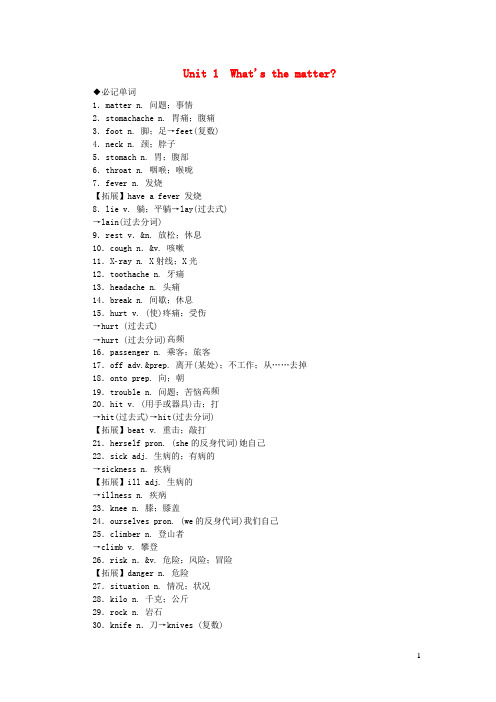
Unit 1 What's the matter?◆必记单词1.matter n. 问题;事情2.stomachache n. 胃痛;腹痛3.foot n. 脚;足→feet(复数)4.neck n. 颈;脖子5.stomach n. 胃;腹部6.throat n. 咽喉;喉咙7.fever n. 发烧【拓展】have a fever 发烧8.lie v. 躺;平躺→lay(过去式)→lain(过去分词)9.rest v.&n. 放松;休息10.cough n.&v. 咳嗽11.Xray n. X射线;X光12.toothache n. 牙痛13.headache n. 头痛14.break n. 间歇;休息15.hurt v. (使)疼痛;受伤→hurt (过去式)→hurt (过去分词)高频16.passenger n. 乘客;旅客17.off adv.&prep. 离开(某处);不工作;从……去掉18.onto prep. 向;朝19.trouble n. 问题;苦恼高频20.hit v. (用手或器具)击;打→hit(过去式)→hit(过去分词)【拓展】beat v. 重击;敲打21.herself pron. (she的反身代词)她自己22.sick adj. 生病的;有病的→sickness n. 疾病【拓展】ill adj. 生病的→illness n. 疾病23.knee n. 膝;膝盖24.ourselves pron. (we的反身代词)我们自己25.climber n. 登山者→climb v. 攀登26.risk n.&v. 危险;风险;冒险【拓展】danger n. 危险27.situation n. 情况;状况28.kilo n. 千克;公斤29.rock n. 岩石30.knife n.刀→knives (复数)31.blood n. 血32.mean v. 意思是;打算;意欲→meaning n. 意思;含义33.importance n. 重要性;重要→important adj. 重要的高频34.decision n. 决定;抉择→decide v. 决定高频35.control n.&v. 限制;约束;管理36.spirit n. 勇气;意志37.death n. 死;死亡→die v. 死→dead adj. 死的高频38.nurse n. 护士◆重点短语1.have a cold 感冒2.have a stomachache 胃疼3.have a sore back 背疼4.lie down 躺下5.see a dentist 看牙医6.take one's temperature 量体温7.have a fever 发烧8.take breaks (take a break) 休息9.in the same way 用同样的方式【拓展】in a way以某种方式on the way在路上by the way 顺便说一声10.go to a doctor 看医生高频【拓展】see a doctor看医生11.get off 下车12.to one's surprise 使……惊讶的;出乎……意料高频【拓展】in surprise 惊讶地13.thanks to 多亏;由于【拓展】thanks for sth. 为……而表示感谢14.in time 及时【拓展】on time 准时15.think about 考虑16.right away 立刻;马上17.get into trouble 陷入麻烦【拓展】be in trouble 有麻烦;遇到困难18.be used to 习惯于……;适应于……19.fall down 摔倒【拓展】fall asleep 入睡fall off 摔下fall behind 落后fall in love with 爱上20.have problems (in) doing sth. 做某事有困难21.take risks (take a risk) 冒险22.run out (of) 用尽;耗尽【拓展】use up用尽;用光23.be ready to do sth. 准备做某事【拓展】get ready for sth. 为某事做好准备24.cut off 切除【拓展】cut up 切碎25.get out of 离开;从……出来高频26.be in control of 掌管;管理27.make a decision 作决定高频28.give up 放弃高频◆重点句子1.What's the matter?怎么了?2.Should I take my temperature?我应该量体温吗?3.At 9:00 a.m. yesterday,bus No.26 was going along Zhonghua Road when the driver saw an old man lying on the side of the road.昨天上午九点,26路公交车正行驶在中华路上,这时司机看到一位老人躺在路边。
八年级英语下册 Unit 1 What’s the matter短语、句子练习(新版)人教新目标版
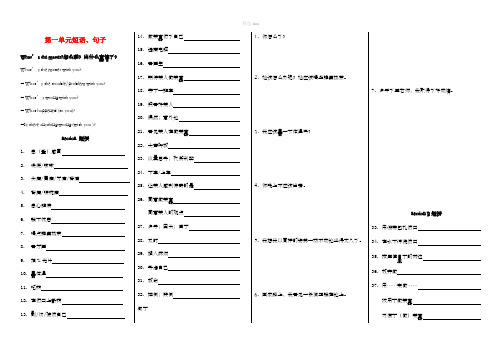
第一单元短语、句子What’ s the matter?怎么啦?出什么事情了?What’ s the matter with you?= What’s the trouble/problem with you?= What’ s wrong with you?= What happened (to you)?=Is there anything wrong (with you )?Section 短语1.患(重)感冒2.发烧/咳嗽3.头痛/胃痛/牙痛/背痛4.背痛/喉咙痛5.患心脏病6.躺下休息7.喝点蜂蜜热茶8.看牙医9.拍X光片10.量体温11.吃药12.在伤口上敷药13.割/切/擦伤自己14.做某事伤了自己15.远离电脑16.看医生17.期待某人做某事18.等下一班车19.照看好某人20.偶然;意外地21.看见某人在做某事22.大声呼救23.认真思考;权衡利弊24.下车/上车25.让某人感到惊奇的是26.同意做某事同意某人的观点27.多亏;因为;由于28.及时29.陷入麻烦30.考虑自己31.救命32.摔倒;跌倒句子1、你怎么了?2、她该怎么办呢?她应该喝些蜂蜜热茶。
3、我应该量一下体温吗?4、你晚上不应该出去。
5、我想我以同样的姿势一动不动地坐得太久了。
6、回家路上,我看见一条狗正躺在地上。
7、多亏了王老师,我取得了好成绩。
Section B短语33.用绷带包扎伤口34.在水下冲洗伤口35.按压住鼻子的两边36.放弃做37.用……来做……被用于做某事习惯于(做)某事38.让自己活得自在39.休息几天40.在烈日下41.感觉病了/感到不舒服42.划伤了膝盖43.流鼻血44.伤了背45.碰了头46.晒伤47.呼吸有问题48.被球打/碰了49.爬山(活动)50.去爬山51.对……有兴趣52.冒险53.失去生命54.因为55.亲自;独自56.(主语为物)耗尽;用光(主语为人)耗尽;用光57.准备做某事58.切掉他一半右臂59.失血太多60.左右为难;进退两难61.在困难的情况下62.摆脱;脱离63.学好英语的重要性64.做出好决定65.掌控一生66.坚持爬山67.活着还是死亡68.发生事故69.放弃做句子1、他在学习英语方面有困难。
2014春八年级下册unit1_what‘s_the_matter课文重难点讲解
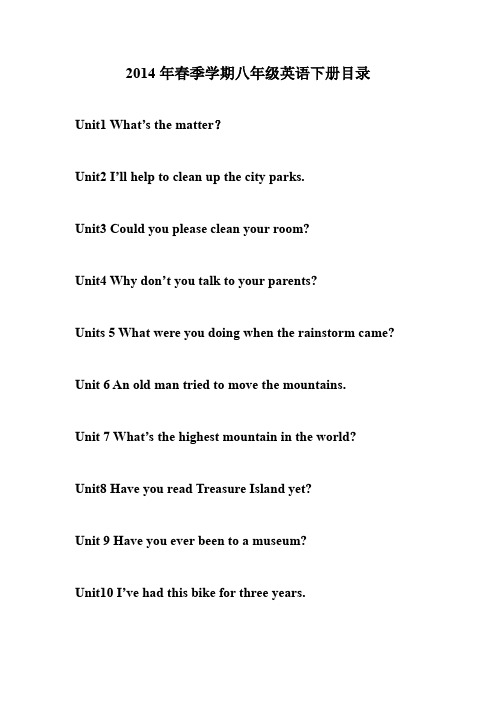
2014年春季学期八年级英语下册目录Unit1 What’s the matter?Unit2 I’ll help to clean up the city parks.Unit3 Could you please clean your room?Unit4 Why don’t you talk to your parents?Units 5 What were you doing when the rainstorm came? Unit 6 An old man tried to move the mountains.Unit 7 What’s the highest mountain in the world?Unit8 Have you read Treasure Island yet?Unit 9 Have you ever been to a museum?Unit10 I’ve had this bike for three years.Unit1 What’s the matter?Section A1. What’ s the matter? 怎么啦?出什么事情了?【解析】matter/ ' mætə(r)) /n.问题;事情What’ s the matter with you?= What’s the trouble with you?= What’ s wrong with you?你怎么了?【注】:matter 和trouble 为名词,其前可加the 或形容词性物主代词,wrong 是adj. 不能加the【2013自贡3】18. —What’s the matter ______ Tom. He is wet through.—His car ran _______ the river.A.with; inB.to; intoC.with; into【用法】用于询问某人有什么病或某人遇到什么麻烦、问题其后跟询问对象时,与介词with连用。
八年级英语下册 Unit 1 What’s the matter知识点总结、作文 (新版)人教新目标
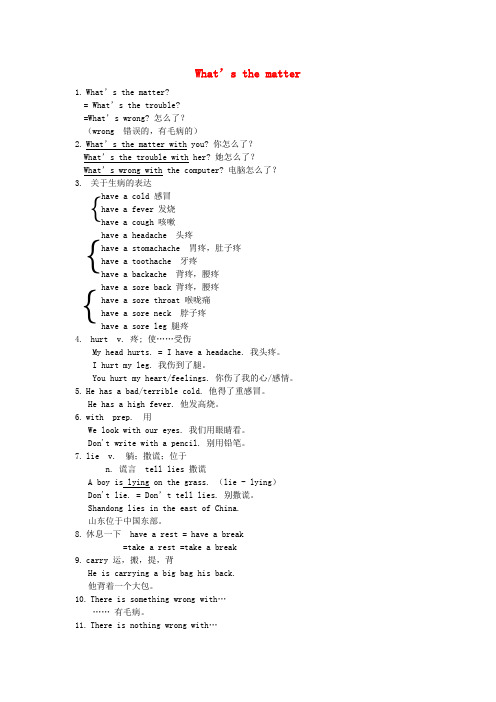
What’s the matter1.What’s the matter?= What’s the trouble?=What’s wrong? 怎么了?(wrong 错误的,有毛病的)2.What’s the matter with you? 你怎么了?What’s the trouble with her? 她怎么了?What’s wrong with the computer? 电脑怎么了?感冒发烧咳嗽头疼胃疼,肚子疼牙疼背疼,腰疼背疼,腰疼喉咙痛脖子疼腿疼疼; 使……受伤My head hurts. = I have a headache. 我头疼。
I hurt my leg. 我伤到了腿。
You hurt my heart/feelings. 你伤了我的心/感情。
5.He has a bad/terrible cold. 他得了重感冒。
He has a high fever. 他发高烧。
6.with prep. 用We look with our eyes. 我们用眼睛看。
Don't write with a pencil. 别用铅笔。
7.lie v. 躺;撒谎;位于n. 谎言 tell lies 撒谎A boy is lying on the grass. (lie - lying)Don't lie. = Don’t tell lies. 别撒谎。
Shandong lies in the east of China.山东位于中国东部。
8.休息一下 have a rest = have a break=take a rest =take a break9.carry 运,搬,提,背He is carrying a big bag his back.他背着一个大包。
10.There is something wrong with………有毛病。
11.There is nothing wrong with………没毛病。
人教版八年级下册英语全册课文原文+翻译

UNIT 1 What's the matter?2d 莉萨,你好吗?我头痛,并且脖子不能动。
我该怎么办?我应该量体温吗?不,听起来不像是你发烧。
周末你做什么了?我整个周末都在玩电脑游戏。
那很可能就是原因。
你需要离开电脑休息几次。
是的,我想我是一个姿势坐得太久没有移动。
我认为你应该躺下休息。
如果明天你的头和脖子还痛的话,就去看医生。
好的。
谢谢,曼迪。
2d Role-play the conversation.Mandy: Lisa, are you OK?Lisa: I have a headache and I can't move my neck. What should I do? Should I take my temperature?Mandy: No, it doesn't sound like you have a fever. What did you do on the weekend?Lisa: I played computer games all weekend.Mandy: That's probably why. You need to take breaks away from the computer.Lisa: Yeah, I think I sat in the same way for too long without moving.Mandy: I think you should lie down and rest. If your head and neck still hurt tomorrow, then go toa doctor.Lisa: OK. Thanks, Mandy.3a 昨天上午九点, 26 路公交车正行驶在中华路上,这时司机看到一位老人躺在路边。
在他旁边的一位妇女在喊救命。
公交车司机, 24 岁的王平,没有多想就停下了公交车。
Unit1what’sthematter_SectionA知识点梳理人教版八年级英语下册

人教版八年级下册英语课本知识点梳理Unit 1 wh at’s the matter? sectionA课文内容:What's the matter? 怎么了? (教材第1页)【用法详解】What's the matter? 怎么了?/出什么事了?常用于询问某人患了何种疾病,遇到了什么困难等,也可用于询问某物出了什么故障,其后可接with sb./sth.,表示“某人/某物怎么了?”。
其中matter 用作名词,意为“问题;事情”matter前须加定冠词the。
【例句】What's the matter? 怎么了?Bad luck.I lost my pen. 真倒霉,我弄丢了钢笔.What's the matter with him? 他怎么了?He has a sore back.他背痛【拓展】matter[动词] 要紧;有关系多用在否定句、疑问句或条件句中It doesn't matter.没关系。
(通常用来回答对方的道歉)I have a cold. 我感冒了。
(教材第1页)【用法详解】have a cold (患)感冒。
其中have 用作及物动词,意为“患(病);遭受(病痛)”,常用于结构“have a/an +疾病名称”表示患病或身体某部位不舒服。
此时它不能用于进行时态,其第三人称单数形式为has,过去式为had。
常见的表示病痛的短语还有:have a fever 发烧have a toothache 牙疼have a headache头痛have a cough 咳嗽have a stomachache胃痛Do you often have a cold? 你经常感冒吗?Jim had a stomachache after supper yesterday.吉姆昨天晚饭后胃痛。
l have a stomachache.我胃痛。
( 教材第1 页)【用法详解】stomachache [名词]胃痛;腹痛是由“名词stomach(;腹部)+ache(疼痛)”构成的复合名词。
人教版八年级下册英语课文翻译全册

Unit1What’sthematter? 2dA丽萨,你好吗?B我头疼,并且脖子不能动。
我该怎么办?我应该量体温吗?A不,听起来不像是你发烧。
周末你做什么了?B我整个周末都在玩电脑游戏。
A那很可能就是原因,你需要离开电脑休息几次。
B是的,我想我是一个姿势做的太久没有移动。
A我认为你应该躺下休息。
如果明天你的头和脖子还痛的话,就去看医生。
B好的,谢谢,曼迪。
3a公交车司机和乘客救了一位老人昨天上午九点,26路公交车正行驶在中华路上,这时司机看到一位老人躺在路边。
在他旁边一位妇女在喊救命。
公交车司机,24岁的王平没有多想就停下来公交车。
他下了车,问那个妇女发生了什么事。
她说那个人有心脏病,应该去医院。
王先生知道他必须快点行动。
他告诉乘客他必须送老人去医院。
他希望大部分或全部乘客下车去等下一辆公交车。
但出乎他的意料,他们都同意和他一起去。
一些乘客帮助王先生把那个老人移到公交车上。
多亏了王先生和乘客们。
医生及时挽救了老人的生命。
“许多人因为不想有麻烦而不想帮助别人,这真令人难受”,一位乘客说。
“但是这位司机没有考虑自己。
他只考虑挽救一条生命。
”2b他失去了手臂但还在爬山阿伦是一个对爬山感兴趣的美国人。
作为一名登山者,阿伦习惯于冒险。
这是关于做危险运动的令人兴奋的事情之一。
有许多次,阿伦因为(意外)事故几乎失去生命。
在2003年4月26日,在犹他州登山时他发现自己在非常危险的处境。
在那天,当阿伦独自登山时,他的手臂被压在落在他身上的一块360千克的岩石下。
因为他的手臂不能自由活动,他在那儿待了五天,希望有人会发现他。
但当他的水喝完了,他知道他将不得不采取措施来挽救的生命了。
他不愿意那天就死去。
因此他用刀子切除了他的一半右臂。
然后,他用左臂给自己打上绷带以至于他不会失去太多的血。
这之后,他爬下山区寻求帮助。
在他失去手臂后,他写了一本名为《生死抉择》(又译作《生死两难》)的书。
他的意思是“处于一个你似乎无法拜托的困境之中”。
八年级英语下册Unit1What'sthematter第四课时作业课件人教版(1)
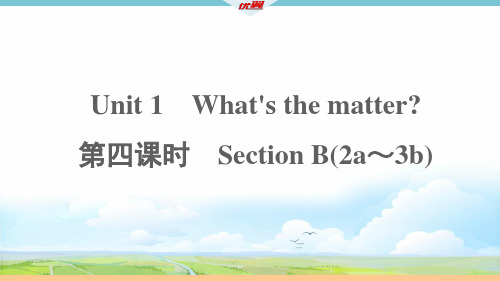
sun for so long.
2.Mom bought three __k__il_o_s__ of apples last night.
3.Tony's right foot was caught under a rock,and he
earthquake to keep him alive(活着的).
Ⅴ.阅读理解。
Being young is no excuse not to think about your health.Now it is the perfect time for teenagers to think about their future health.Health problems develop when they are older.The problems usually star ted when they were young.Teenagers often eat a lot of junk food and watch TV all day.It is possible for them to
but it could be bad.Going to McDonald' s or Wendy' s on the way to school or wor k is much easier than cooking a healthy meal.You don' t need a lot of time to exer cise.J ust be sma r t.Instead of having fast food,you should have an apple or salad.Spend 15 - 25 minutes thr ee to five times a week going for a walk or dancing, whatever bur ns those calor ies ! Tr y to do easy exer cise.You can keep healthy and have a happy life at the same time.
2023人教版八年级英语下册交互课件-【第4课时(B 1a-1d)】 (4)
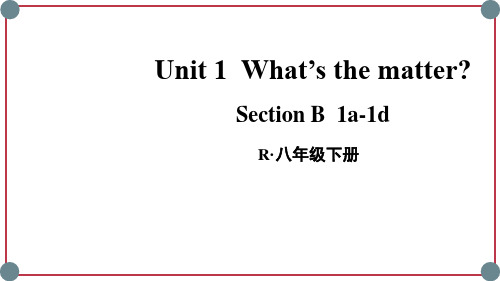
__3__ Clean your face.
洗脸。
Now work in pairs and make a dialogue according to the blanks.
What’s the matter with the boy? He _f_e_ll__ down and _h_u_r_t_ his back. First, _h__e_s_h_o_u_l_d_g_o__to__th__e_h_o_s_p_i_ta_l_. __________ Next, __h_e_s_h_o_u_l_d_g_e_t_a_n__X_-_r_a_y_.______________ Then, _h_e__s_h_o_u_ld__r_e_s_t _fo_r__a_f_e_w__d_a_y_s_. _________
划伤膝盖
have a fever
发烧
have a nosebleed
流鼻血
hurt one’s back
背部受伤
While-listening
听力训练
Listen carefully and answer the questions below.
1. What’s the relationship between the two speakers?
2. Store some common sense about treatments of accidents and the health problems in daily life.
3. Learn to take care of yourself and care for others.
Lead-in
告诉她把头低下
Problems
英语人教版八年级下册第一单元What’s-the-matter
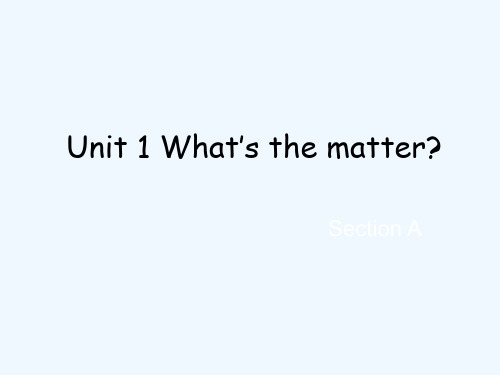
A: What’s the matter? B: I’m not feeling well.
I have a fever. A: When did it start? B: About two days ago. A: Oh, that’s too bad.
Unit 1 What’s the matter?
Section A
body
Name each part of the body
arm
ear
eye foot
leg hand
mouth
nose
tooth
neck
Follow me:
• Everybody moves your body • Nod your head and touch your face • Touch your nose and close your eyes • Touch your ears and clap your hands • Raise your arms and look at your back • Touch your stomach and tap your foot • Sit down and move your legs
What should she do? She should take some medicine.
What’s the matter with you? I have a toothache. You should see a dentist. That’s a good idea.
What’s the matter with her? She has a sore throat. What should she do?
Unit1 What's the matter_Section A 3a_4c知识点语八年级下册
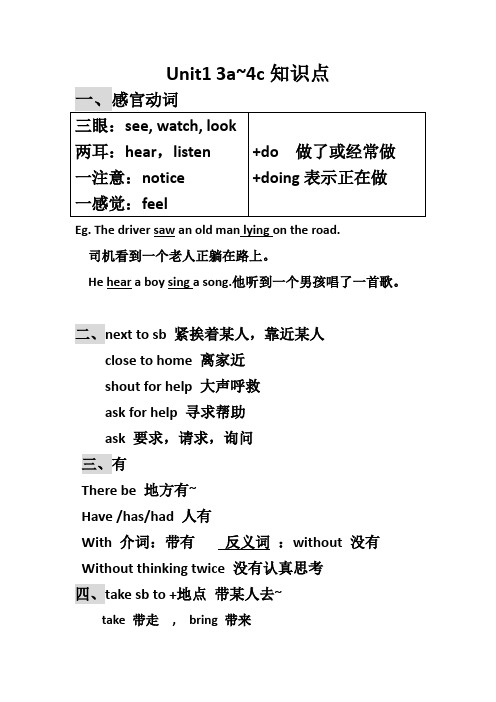
Eg. The driver saw an old man lying on the road.司机看到一个老人正躺在路上。
He hear a boy sing a song.他听到一个男孩唱了一首歌。
二、next to sb 紧挨着某人,靠近某人close to home 离家近shout for help 大声呼救ask for help 寻求帮助ask 要求,请求,询问三、有There be 地方有~Have /has/had 人有With 介词:带有反义词:without 没有Without thinking twice 没有认真思考四、take sb to +地点带某人去~take 带走, bring 带来五、decide动词-------decision 名词Decide to do sth 决定做某事Hope/expect to do sth 希望做某事Want to do sth 想做某事六、thanks for~ 感谢~eg. Thanks for help 谢谢帮助thanks to ~ 多亏~ 由于~eg. thanks to Mr.Wang 多亏了王先生七、saveSave a life 拯救生命;Save water 节约用水八、in time 及时, on time 按时九、hurt yourself 伤到你自己Cut yourself 割伤你自己十、go to the dentist = See a dentist去看牙医十一、反身代词见书上P108Help yourself, please 请自便,by yourself依靠你自己Learn yourself 自学,dress yourself 自己穿衣服。
人教版英语八年级下册第一单元知识点
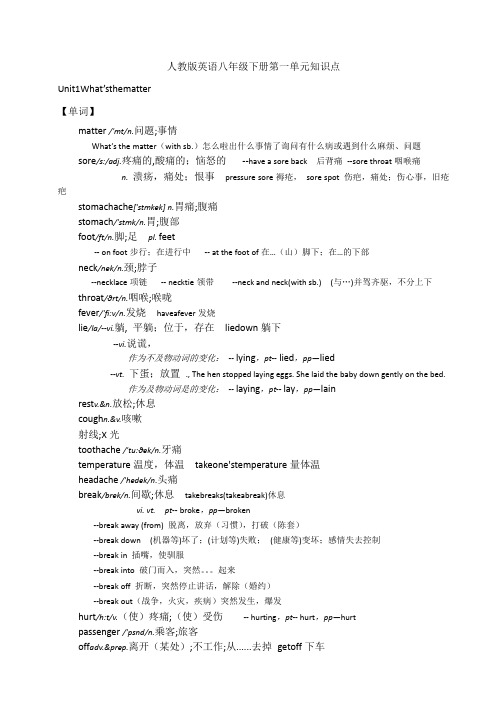
人教版英语八年级下册第一单元知识点Unit1What’sthematter【单词】matter /'mt/n.问题;事情What’s the matter(with sb.)怎么啦出什么事情了询问有什么病或遇到什么麻烦、问题sore/s:/adj.疼痛的,酸痛的;恼怒的--have a sore back 后背痛--sore throat咽喉痛n. 溃疡,痛处;恨事pressure sore褥疮,sore spot 伤疤,痛处;伤心事,旧疮疤stomachache['stmkek] n.胃痛;腹痛stomach/'stmk/n.胃;腹部foot/ft/n.脚;足pl. feet-- on foot步行;在进行中-- at the foot of在…(山)脚下;在…的下部neck/nek/n.颈;脖子--necklace项链-- necktie领带--neck and neck(with sb.) (与…)并驾齐驱,不分上下throat/θrt/n.咽喉;喉咙fever/'fi:v/n.发烧haveafever发烧lie/la/--vi.躺, 平躺;位于,存在liedown躺下--vi.说谎,作为不及物动词的变化:-- lying,pt-- lied,pp—lied--vt. 下蛋;放置., The hen stopped laying eggs. She laid the baby down gently on the bed.作为及物动词是的变化:-- laying,pt-- lay,pp—lainrest v.&n.放松;休息cough n.&v.咳嗽射线;X光toothache /'tu:θek/n.牙痛temperature温度,体温takeone'stemperature量体温headache /'hedek/n.头痛break/brek/n.间歇;休息takebreaks(takeabreak)休息vi. vt.pt--broke,pp—broken--break away (from) 脱离,放弃(习惯),打破(陈套)--break down (机器等)坏了;(计划等)失败;(健康等)变坏;感情失去控制--break in 插嘴,使驯服--break into 破门而入,突然。
Unit1What'sthematter大单元分析人教版八年级英语下册
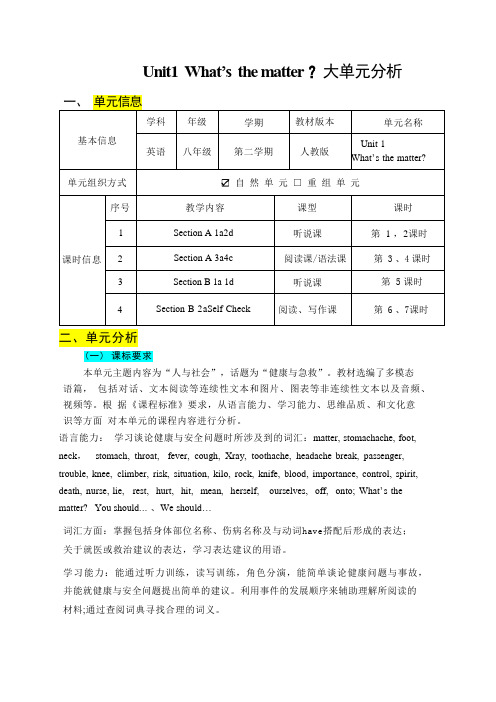
Unit1 What’s the matter ?大单元分析二、单元分析(一) 课标要求本单元主题内容为“人与社会”,话题为“健康与急救”。
教材选编了多模态语篇,包括对话、文本阅读等连续性文本和图片、图表等非连续性文本以及音频、视频等。
根据《课程标准》要求,从语言能力、学习能力、思维品质、和文化意识等方面对本单元的课程内容进行分析。
语言能力:学习谈论健康与安全问题时所涉及到的词汇:matter, stomachache, foot, neck,stomach,throat, fever,cough,Xray,toothache,headache break, passenger, trouble, knee, climber, risk, situation, kilo, rock, knife, blood, importance, control, spirit, death, nurse, lie, rest, hurt, hit, mean, herself, ourselves, off, onto; What’s the matter? You should... 、We should…词汇方面:掌握包括身体部位名称、伤病名称及与动词have搭配后形成的表达;关于就医或救治建议的表达,学习表达建议的用语。
学习能力:能通过听力训练,读写训练,角色分演,能简单谈论健康问题与事故,并能就健康与安全问题提出简单的建议。
利用事件的发展顺序来辅助理解所阅读的材料;通过查阅词典寻找合理的词义。
思维品质:能够在听说活动中准确获取并表达有关疾病不适及医治和处理建议的信息,提高思维的逻辑性和缜密性。
文化意识:了解阿伦.罗尔斯顿的经历及其回忆录。
通过学习,能够学会关心自身和他人身体健康,提出一些建议,了解珍爱生命、健康生活的重要性。
(二) 教材分析单元内容框架第1,2课时第3,4课时第5,6课时第7课时学会处理紧急伤势的方法,学习主人公在事故发生时的正确处理方法。
人教版八年级英语下册Unit 1 What’s the matterSection B(2a—2e)
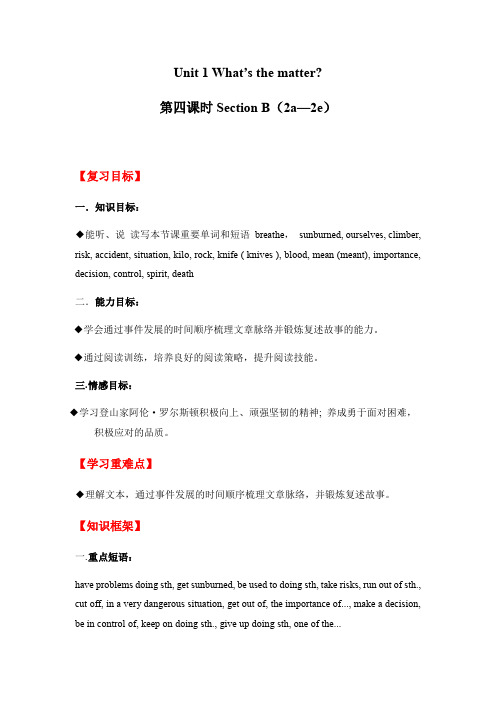
Unit 1 What’s the matter?第四课时Section B(2a—2e)【复习目标】一.知识目标:◆能听、说读写本节课重要单词和短语breathe,sunburned, ourselves, climber, risk, accident, situation, kilo, rock, knife ( knives ), blood, mean (meant), importance, decision, control, spirit, death二.能力目标:◆学会通过事件发展的时间顺序梳理文章脉络并锻炼复述故事的能力。
◆通过阅读训练,培养良好的阅读策略,提升阅读技能。
三.情感目标:◆学习登山家阿伦·罗尔斯顿积极向上、顽强坚韧的精神; 养成勇于面对困难,积极应对的品质。
【学习重难点】◆理解文本,通过事件发展的时间顺序梳理文章脉络,并锻炼复述故事。
【知识框架】一.重点短语:have problems doing sth, get sunburned, be used to doing sth, take risks, run out of sth., cut off, in a very dangerous situation, get out of, the importance of..., make a decision, be in control of, keep on doing sth., give up doing sth, one of the...二.重难点句子:1.As a moutain climber, Aron is used to taking risks.作为一名登山者,阿伦已习惯了冒险.2. But when his water ran out, he knew that he would have to do something to save his own life.但是当他的水喝光之后,他知道他必须要做点什么来挽救自己的生命.3. His love for mountain climing is so great that he kept on climbing moutains even after this experience.他对登山如此痴迷,以至于在这次断臂之后他依然继续从事登山运动.4. Let’s think about it before we find ourselves “between a rock and a hard place”, and before we have to make a decision that could mean life or death.在我们发现自己处于困境之前或在我们不得不作出生死抉择之前,让我们先思考一下吧。
钦南区第八中学八年级英语下册Unit1What'sthematter第四课时SectionB(2a_

第四课时Section B(2a-3b)Teaching Key Points【教学重点】The vocabulary:ourselves,accident,situation,knife,blood,mean,importance,decision,control,spirit,death,nurse,be used to,take a risk(take risks),run out,cut off,get out of,be in control of, keep on(doing sth.),give upTarget language:1.Aron Ralston is an American man who is interested in mountain climbing.2.Aron is used to taking risks.3.He was not ready to die that day.Teaching Difficult Points【教学难点】1.be used to doing sth.2.give up doing sth.3.Learn to describe events in a certain order.Teaching Aids【教学工具】an English book,a tape recorder and CAITeaching Steps【教学过程】★Step 1Preview and perception【预习感知】Ask the students to read the vocabulary and target language.用所给单词的适当形式填空。
1.We sat around the fire to keep ______(our) warm.2.At last he made a ______(decide).3.You should give up ______(smoke).4.Nobody knew his ______(die).5.He bandaged his arm so that he would not lose too much ______(blood).★Step 2Consociation and exploration【合作探究】Let the students read the book by themselves in order to find out the answers.They can discuss the questions in groups or ask the teacher for help.When they finish the questions,ask some students to check the answers.★Step 3Leading in【情景导入】1.Greetings.2.Introduce what to learn in this period,especially the article in 2b,He Lost His Arm But Is Still Climbing.★Step 4Pre-task【准备任务】Page 6,2a1.Look at 2a.2.T:Accidents or problems can sometimes happen when we do sports.Write the letter of each sport next to each accident or problem that can happen.3.Ask the students to talk about what we should do when the accidents or problems happen.4.Practice the conversations in pairs.5.Ask some pairs to act it out.★Step 5While-task【过程任务】Page 6,2b1.Present these new words on the screen and teach the new words.2.Ask students to repeat them.And make sure everyone knows the meanings.3.Write the words you don't know the meanings in the box.And then look up the words in the dictionary.Writers describe events in a certain order.Finding the order of events will help you understand what you are reading.4.Practice reading the passage.5.Page 7,2c & 2d(1)Read the passage again.And circle True,False or Don't Know.(2)If they can't find the answers,they can discuss in groups or ask the teacher for help.(3)Ask one or two students to check the answers.(4)Ask the students to read the passage quickly and find the answers in 2d.★Step 6Post-task【后续任务】Page 7,2e1.Ask the students to put the sentences in the correct order.Then use them to tell Aron's story to the partner.2.Try to add other details from the reading.3.Page 7,3a(1) Look at the accident or health problem.(2) Imagine you are the school nurse and a student just had an accident or a health problem.Make notes about what he /she should and shouldn't do.Discuss them in groups.4.Page 8,3b(1)Look at the questions and the phrases in the box.(2)Ask the students to read and practice the questions and the phrases in the box.★Step 7Consolidation practice【巩固练习】Look at the students' book of the 4th exercise.★Step 8Summary【课堂小结】In this class we have learned a passage.We should master it.And we should master the new phrases “be used to,take a risk(take risks),run out,cut off,get out of,be in control of, keep on(doing sth.),give up”,too.★Step 9Homework【家庭作业】1.Write a strange event after class.2.Retell the story about Aron Ralston.Board Design板书设计Unit 1What's the matter?The fourth period Section B(2a-3b)1.Key words:ourselves,accident,situation,knife,blood,mean,importance,decision,control,spirit,death,nurse2.Key phrases:be used to,take a risk(take risks),run out,cut off,get out of,be in control of,keep on(doing sth.),give up3.Key sentences:(1)Aron Ralston is an American man who is interested in mountain climbing.(2)Aron is used to taking risks.(3)He was not ready to die that day.Unit 4 What’s the best movie theaterSection A (Grammar Focus-3c)Ⅰ.根据句意及汉语提示填写单词。
松原市八中八年级英语下册Unit1What'sthematter单元语法专题_GrammarFocu
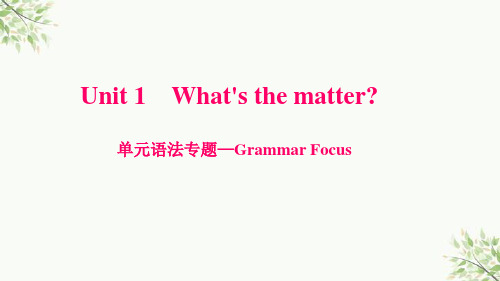
13.Mrs.Hand's daughter has a stomachache.(対画线部分提问) _W__h_a_t_'s__ __t_h_e__ __m__a_tt_e_r/_t_ro_u_b_l_e___ ___w__it_h___ Mrs.Hand's daughter? 14.Lisa should ask her parents for help.(対画线部分提问) ___W__h_a_t__ __s_h_o_u_l_d__ Lisa ____d_o___ ?
Unit 1 What's the matter?
单元语法专题—Grammar Focus
询问健康问题及遇到麻烦的表达方法
1.询问某人患了何种疾病或遇到了何种麻烦时 , 常用以下几种结构 来表达 :
What's the matter (with sb.)? (某人)怎么了 ? What's wrong (with sb.)? (某人)怎么了 ? What's the trouble (with sb.)? (某人)出什么事了 ? What happened (to sb.)? (某人)发生了什么事 ? Are you OK? 你没事吧 ?
comin
to discuss
g
(二)用方框中所给单词的适当形式填空。(5×4分=20分) week , physical , begin , promise , paint
6.Kate should do more ________ exercise , such as walking , running and swimming.
As teenagers, you have many dreams. These dreams can be very big, such as winning the Nobel Prize, or they can be 21.________. You may just want 22.________ the best student in your class. Once you find a dream, what do you do with it? Do you ever try to 23.________ your dream come true? You may think you're not very good at some school 24.________ or
